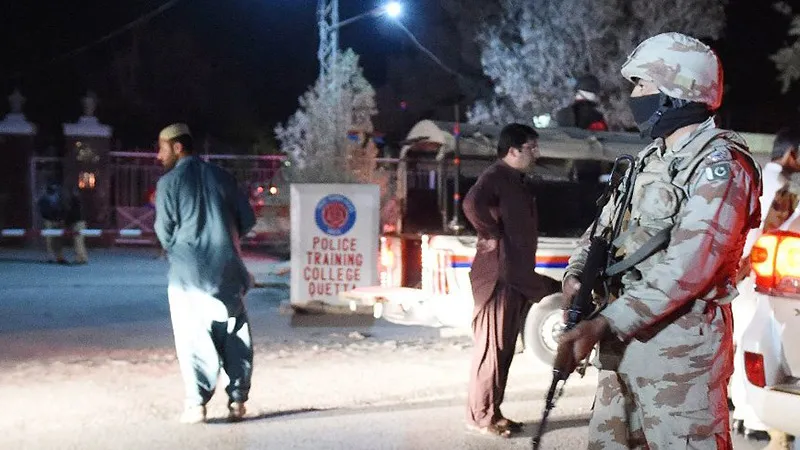The 24 October attack at a police training academy in Quetta, Balochistan has once again highlighted the complexity and multitude of security challenges that Pakistan faces. The attack saw three gunmen taking students hostage and triggering two suicide bombs which killed sixty one police cadets and injured over 120 others.
The brutal attack echoes of the series of terrorist attacks that Pakistan has witnessed in the last few years, including the December 2014 massacre in Peshawar, the January 2016 assault on Bacha Khan University, the March 2016 suicide bomb attack in Lahore and the most recent August 2016 suicide bomb in Quetta.
< style="color: #0069a6;">It is a stinging reminder for Pakistan that it has miles to go before such attacks cease to happen.
The government had earlier stated that the attack was carried out by Lashkar-e-Jhangvi, a Sunni supremacist militant group that is affiliated with the Tehreek-e-Taliban Pakistan (TTP) or the Pakistani Taliban. While the group has not officially confirmed this, the Islamic State has claimed responsibility for the attack.
This is disturbing given that Jamaat-ul-Ahrar (a faction of the TTP) and ISIS carried out the bombing in August 2016 which killed seventy civil servants and lawyers at the Quetta Civil Hospital. Despite growing evidence of militant factions and online recruits being involved in terrorist activities, Pakistan has repeatedly stated that the IS has no organisational presence in Pakistan. The recent attack should bring them to the realisation and acceptance that the Islamic State is a serious threat. Its collusion with homegrown terror outfits, such as the TTP makes it an even more grim and dangerous adversary.
Few days before the December 2014 attack at the Army Public School in Peshawar that killed 169 students and teachers, the military announced its counter terrorism operation Zarb-e-Azb. It was expected to root out militancy from Pakistan's tribal areas along its border with Afghanistan. Since then the military, arguably, has had some success in this regard. While the army has cracked down on terror groups operating in the area, the operations have led to a mass displacement of militants across the border into Afghanistan and into other parts of Pakistan. This has forced thousands of militants to join the Afghan Taliban and the Islamic State. While the latter operates in areas along Afghanistan's eastern border, the former continues to threaten the Kabul government.
Groups such as the Pakistani Taliban have remained resilient and resourceful in spite of the army's operations and the frequency and intensity of the recent attacks suggest a greater coordination between the TTP and its factions and the Islamic State. Any such alliance spells serious danger for Pakistan.
< style="color: #0069a6;">The recent attacks should be a wake-up call for the military. Pakistan has a history of differentiating between good and bad terrorists, and while it has cracked down on groups such as the TTP that threatened Pakistan’s internal security, it has helped groups that attack Afghanistan and India to flourish.
Its support for the Afghan Taliban, Haqqani Network, Lashkar-e-Taiba and Jaish-e-Mohammad has not only been one of the root causes of terrorism in South Asia but has also had the reverse effect of threatening Pakistan's survival. Pakistan's duplicity in assisting the Afghan Taliban and killing members of the Paksitan Taliban has cost it greatly and the TTP's attacks in Balochistan are a consequence of that.
Quetta as the capital of Balochistan has suffered from attacks not only from militants but also from Baloch separatists, each with a separate intention. Violent attacks by Baloch separatists seek to break Balochistan away from the Pakistan state; militants and terror attacks are intended to attack and destabilise the state. This is why recent attacks have targeted those supporting the government or the system in some way, for instance, lawyers, civil servants, and police cadets.
Balochistan also provides an attractive target for militants as it is home to the $46 billion China-Pakistan-Economic-Corridor (CPEC) that extends from China's Xinjiang province to the port city of Gwadar in Balochistan. Pakistan has repeatedly assured China of the security of the port and of the CPEC project in general. However, regular attacks in Quetta and other parts of Balochistan are sure to aggravate any fears that the Chinese might be having. The attack in Quetta, therefore, should not only be understood as a brutal attack on Pakistan’s civil society but also as an attack on the stability and future of Pakistan's economic dream project.
< style="color: #0069a6;">Such attacks question Pakistan's earnestness on fighting terrorism and demonstrate the failure of the government and the military to successfully create a national counter terrorism agenda.
The National Action Plan (NAP), which was implemented after the 2015 Peshawar attack, aimed to strengthen the capacity building of civilian institutions to deal with terrorism. While the military has arrested numerous suspected militants and enforced crackdowns on some militant organisations, especially in North Waziristan and Karachi, key elements of the NAP remain unused and forgotten.
NAP lays emphasis on countering militancy on the internet, however, the government has done little in controlling terrorist and militant propaganda both on the internet and offline. In addition, there is no clarity as to which organisation in the government is responsible for this. The set up of military courts to fast track terror cases and the lifting of the moratorium on the death penalty was met with much support among civil society. However, such actions are short term solutions to a complex problem. The government must realise this and simultaneously work on strengthening the civilian judicial system to try terror cases. It also needs to address problems in the system that allow terrorists and militants to walk away scot-free.
Last week, the Pakistan government froze the bank assets of over 5,100 militants including Masood Azhar, the leader of Jaish-e-Mohammad. However, such action is symbolic and not rooted in a change of attitude. Increasing pressure from the United States to act against terrorists has led Pakistan government to take this step and it is unlikely that they will see it through the end. That being said, Pakistan must realise that by choking terrorists' funds, in investigating cases of terror financing and through prevention of fundraising by militant organisations, it can begin a slow path of course correction and redeem itself steadily in the eyes of the world. Until then, the death of innocent police cadets will not be the last time Quetta and Pakistan bleeds.
This commentary originally appeared in World Is One News.
The views expressed above belong to the author(s). ORF research and analyses now available on Telegram! Click here to access our curated content — blogs, longforms and interviews.




 PREV
PREV


